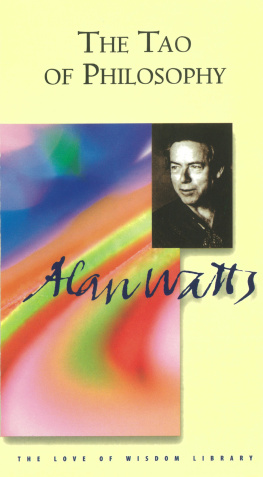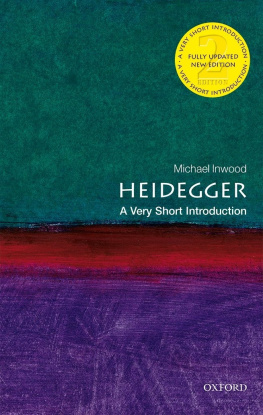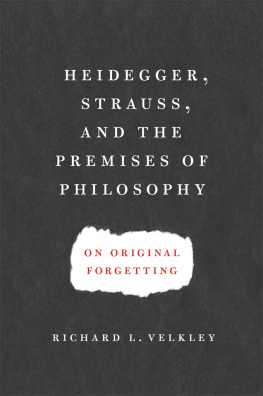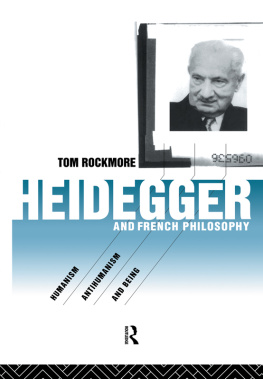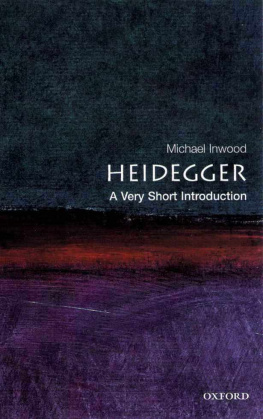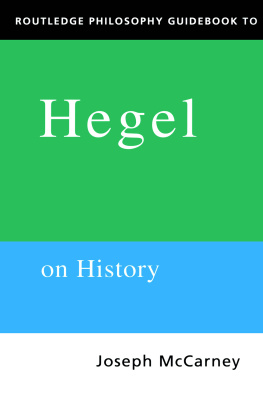Michael Watts - The Philosophy of Heidegger
Here you can read online Michael Watts - The Philosophy of Heidegger full text of the book (entire story) in english for free. Download pdf and epub, get meaning, cover and reviews about this ebook. year: 2014, publisher: Routledge, genre: Science. Description of the work, (preface) as well as reviews are available. Best literature library LitArk.com created for fans of good reading and offers a wide selection of genres:
Romance novel
Science fiction
Adventure
Detective
Science
History
Home and family
Prose
Art
Politics
Computer
Non-fiction
Religion
Business
Children
Humor
Choose a favorite category and find really read worthwhile books. Enjoy immersion in the world of imagination, feel the emotions of the characters or learn something new for yourself, make an fascinating discovery.
- Book:The Philosophy of Heidegger
- Author:
- Publisher:Routledge
- Genre:
- Year:2014
- Rating:5 / 5
- Favourites:Add to favourites
- Your mark:
- 100
- 1
- 2
- 3
- 4
- 5
The Philosophy of Heidegger: summary, description and annotation
We offer to read an annotation, description, summary or preface (depends on what the author of the book "The Philosophy of Heidegger" wrote himself). If you haven't found the necessary information about the book — write in the comments, we will try to find it.
The Philosophy of Heidegger — read online for free the complete book (whole text) full work
Below is the text of the book, divided by pages. System saving the place of the last page read, allows you to conveniently read the book "The Philosophy of Heidegger" online for free, without having to search again every time where you left off. Put a bookmark, and you can go to the page where you finished reading at any time.
Font size:
Interval:
Bookmark:
Heidegger
Continental European Philosophy
This series provides accessible and stimulating introductions to the ideas of continental thinkers who have shaped the fundamentals of European philosophical thought. Powerful and radical, the ideas of these philosophers have often been contested, but they remain key to understanding current philosophical thinking as well as the current direction of disciplines such as political science, literary theory, social theory, art history and cultural studies. Each book seeks to combine clarity with depth, introducing fresh insights and wider perspectives while also providing a comprehensive survey of each thinkers philosophical ideas.
The Philosophy of Agamben
Catherine Mills
The Philosophy of Derrida
Mark Dooley and Liam Kavanagh
The Philosophy of Foucault
Todd May
The Philosophy of Gadamer
Jean Grondin
The Philosophy of Habermas
Andrew Edgar
The Philosophy of Heidegger
Michael Watts
The Philosophy of Hegel
Allen Speight
The Philosophy of Husserl
Burt C. Hopkins
The Philosophy of Kierkegaard
George Pattison
The Philosophy of Merleau-Ponty
Eric Matthews
The Philosophy of Nietzsche
Rex Welshon
The Philosophy of Schopenhauer
Dale Jacquette
The Philosophy of
Heidegger
Michael Watts

With thanks to my parents and all the family for their considerable support.
First Published 2011 by Acumen
Published 2014 by Routledge
2 Park Square, Milton Park, Abingdon, Oxon OX14 4RN
711 Third Avenue, New York, NY 10017, USA
Routledge is an imprint of the Taylor and Francis Group, an informa business
Michael Watts, 2011
This book is copyright under the Berne Convention.
No reproduction without permission.
All rights reserved. No part of this book may be reprinted or reproduced or utilised in any form or by any electronic, mechanical, or other means, now known or hereafter invented, including photocopying and recording, or in any information storage or retrieval system, without permission in writing from the publishers.
Notices
Practitioners and researchers must always rely on their own experience and knowledge in evaluating and using any information, methods, compounds, or experiments described herein. In using such information or methods they should be mindful of their own safety and the safety of others, including parties for whom they have a professional responsibility.
To the fullest extent of the law, neither the Publisher nor the authors, contributors, or editors, assume any liability for any injury and/or damage to persons or property as a matter of products liability, negligence or otherwise, or from any use or operation of any methods, products, instructions, or ideas contained in the material herein.
ISBN: 978-1-84465-263-1 (hardcover)
ISBN: 978-1-84465-264-8 (paperback)
British Library Cataloguing-in-Publication Data
A catalogue record for this book is available from the British Library.
Typeset in Classical Garamond.
Contents
No Western philosopher since Socrates has attracted such varied, often totally opposed, views as Heidegger. In a popular history of philosophy by Bertrand Russell, the entry on Heidegger comprises only one short paragraph. The first line reads: Highly eccentric in its terminology, his philosophy is extremely obscure. One cannot help suspecting that language is here running riot (1989: 303). The analytic philosopher A. J. Ayer once accused him of charlatanism (1984: 228); Roger Scruton, a contemporary conservative British philosopher, described Heideggers most important work Being and Time as formidably difficult unless it is utter nonsense, in which case it is laughably easy (2001: 270). Against these dismissals, the American philosopher Richard Rorty (1981: 5) rates Heidegger as one of the three most important philosophers of the twentieth century, along with John Dewey and Wittgenstein.
Heidegger also, frequently, has been damned both as a man and as a thinker for his brief but enthusiastic support of the Nazis. This was symbolized by his acceptance of the post of rector of Freiburg University in 1933, where he proved a passionate advocate of subordinating the university to the new Nazi regime. Although he resigned the rectorship after only a year, and became increasingly critical of the direction taken by the Nazi party, he never uttered a full apology for his support of National Socialism, nor admitted guilt for having done so, during the thirty-one years he lived after 1945. If Heidegger could not, even with hindsight, accept that he had been wrong, many have questioned how much value should be placed on his work, particularly because his philosophy stresses the importance of a life lived as an experience in time and place, rather than as a collection of abstract theories.
For the English-speaker, such biographical problems are not the only drawbacks. Heidegger wrote a distinctive, notoriously dense prose that, when translated, can appear impenetrably Teutonic. Unsurprisingly, therefore, for a long time he was ignored in the Anglo-American world. But he was hailed as one of existentialisms founding fathers in continental Europe from the 1940s. Since his death in 1976 he has become almost as famed in the anglophone world, despite further controversies over his links with the Nazis and over his exploitative relationship with Hannah Arendt when she was his student. Some critics have seen him as both a Nazi and an unscrupulous seducer of a vulnerable teenager; for others, he appears a covert critic of Nazism and an intellectual mentor to Arendt as well as her lover. Above all, he is now held to have had vital insights into the central problems of modern life, including the uses and abuses of technology, literature, poetry, theatre, sociology and even architecture.
Deeply concerned with the way that language shapes human thought, Heidegger made a vital contribution to the development of phenomenology, founded by his teacher Edmund Husserl. But Heidegger outstripped his mentors achievement, finally passing beyond phenomenology to create a wholly new approach to thinking that profoundly influenced German philosophers such as Jrgen Habermas and Hans-Georg Gadamer, English-speaking philosophers such as Charles Taylor and Rorty, and French philosophers such as Jacques Derrida, Michel Foucault and Maurice Merleau-Ponty. Indeed, he inspired Jean-Paul Sartre to create the twentieth centurys perhaps most famous philosophical school: existentialism. (This was despite Heideggers letter to Jean Beaufret in 1947 Letter on Humanism, in which he distanced his own philosophy from French existentialism.) For many, Heidegger is finally the ultimate philosopher of Being, who pursued the question of the meaning of Being relentlessly until death ended his quest.
Heidegger was remarkably prescient about some of the current ecological problems. Strongly opposed to many trends in industrial society, with its emphasis on technology and mass consumption, he attacked the mistreatment of livestock and the misuse of the planets resources. When even leading scientists (such as Martin Rees, one of Britains most respected astronomers) now give humanity a less-than-even chance of surviving the century, Heideggers declaration Only a god can save us, made in 1966, seems uncannily prophetic about the deepening ecological crisis. He now appears a timely philosopher, whose deep ontological thinking, revealed in Being and Time, his masterpiece of 1927, is still pressingly pertinent.
Font size:
Interval:
Bookmark:
Similar books «The Philosophy of Heidegger»
Look at similar books to The Philosophy of Heidegger. We have selected literature similar in name and meaning in the hope of providing readers with more options to find new, interesting, not yet read works.
Discussion, reviews of the book The Philosophy of Heidegger and just readers' own opinions. Leave your comments, write what you think about the work, its meaning or the main characters. Specify what exactly you liked and what you didn't like, and why you think so.




